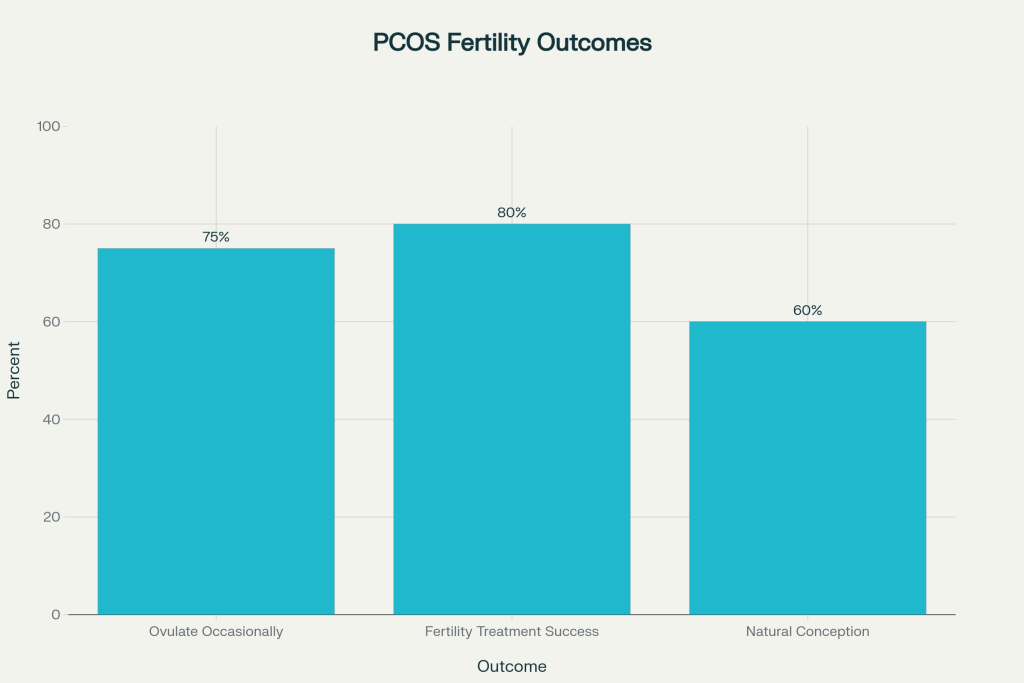
As we mentioned last week, Polycystic Ovary Syndrome (PCOS) affects up to 1 in 10 women of reproductive age, yet myths about this common hormonal condition continue to cause confusion and unnecessary anxiety. One of the most persistent misconceptions is that having PCOS means you can never get pregnant. Let’s set the record straight and highlight why busting myths like this matters.
The Myth
“If you have PCOS, you can’t get pregnant.”
- Myth: PCOS equals infertility.
- Fact: Many women with PCOS do conceive—sometimes naturally, and often with a bit of medical support.
This myth is widespread, and it’s easy to see why. For many women globally, PCOS is a leading cause of infertility due to irregular ovulation, but equating it with absolute infertility is both inaccurate and harmful.
Why Busting the Myth Matters
- Empowerment: Accurate knowledge enables women with PCOS to advocate for themselves and seek timely fertility support.
- Reduces Stigma: Dispelling the link between PCOS and inevitable infertility helps reduce self-blame, guilt, and isolation.
- Improved Health Outcomes: Early guidance and tailored treatment can prevent unnecessary emotional stress and enhance overall well-being.
The Facts: What Does the Science Say?
- PCOS and Ovulation
PCOS affects ovulation, which is the release of an egg from the ovary. Many people with PCOS have irregular periods because they don’t ovulate regularly. However, irregular ovulation does not mean ovulation never occurs.- Recent Research: Some women with PCOS can ovulate occasionally, leading to irregular but spontaneous menses and natural conception, according to the American Society for Reproductive Medicine (ASRM). The report further emphasizes that anovulation in PCOS is typically not absolute. (Fauser et al., 2011)
- Fertility Outcomes
With appropriate management, many people with PCOS can and do become pregnant—sometimes naturally, and sometimes with medical support.- Fertility Treatments:
According to the American Society for Reproductive Medicine (ASRM), first-line treatments like lifestyle modification, ovulation induction with medications (such as letrozole or clomiphene), and assisted reproductive technologies (ART) are highly effective for women with PCOS (ASRM, 2023). - Success Rates:
A 2022 study published in Fertility and Sterility showed that over 80% of women with PCOS who sought fertility treatment achieved pregnancy within two years (Legro et al., 2022). And guess what? Approximately 60% of women with PCOS conceive naturally, without the need for medical intervention.
- Fertility Treatments:

Real Women, Real Stories
Women like Diane, diagnosed with PCOS in her teens, went through years of irregular periods and frustrating advice before seeking fertility care. After finding the right clinic and support, she conceived via IUI and delivered a healthy baby.
Miranda faced years of irregular cycles, but conceived within three months with a combination of progesterone and tracking her body’s natural cycles.
These stories are just a few among thousands that prove a PCOS diagnosis is not a life sentence for infertility.
I remember the first time I read about PCOS. I was a teenager with irregular periods and a hairy face, trying to understand the changes in my body. It was the late 1990s, and I finally got answers from an old Reader’s Digest issue. With the discovery came a new fear: the article said the words “you might never get pregnant”. It was a heavy burden to carry, and for a while, I believed it.
But as I learned more and connected with others, I discovered stories of hope and resilience—women who became mothers, sometimes after a long journey, sometimes against all odds. My own path with PCOS has taught me that while the road to pregnancy may be different, it is far from closed.
When to Seek Help
If you have PCOS and are struggling to conceive, consult a reproductive specialist. They can help you:
- Track ovulation accurately,
- Address any underlying metabolic concerns (like insulin resistance), and
- Develop a personalized treatment plan.
Key Takeaway
PCOS does not mean you can’t get pregnant. While it can make conception more challenging, most people with PCOS can become pregnant—naturally or with help. Knowledge, support, and the right medical care can make all the difference.
“PCOS can make it trickier to get pregnant because of irregular ovulation, but it doesn’t mean you can’t have children. With the right treatment and a bit of patience, many women with PCOS do become mums.” – Care Fertility Clinic
Next Up:
“Myth: You Must Have Ovarian Cysts to Have PCOS”—stay tuned as we continue to debunk the most common misconceptions about PCOS.
References
- Fauser, B. C. J. M., Tarlatzis, B. C., Rebar, R. W., Legro, R. S., Balen, A. H., Lobo, R., . . . Barnhart, K. (2011). Consensus on women’s health aspects of polycystic ovary syndrome (PCOS). Human Reproduction, 27(1), 14–24. Read the study
- American Society for Reproductive Medicine (ASRM). (2023). “Patient Fact Sheet: PCOS and Infertility.” Read the ASRM Resource.
- Legro, R. S., et al. (2022). “A personalized medicine approach to ovulation induction/ovarian stimulation: development of a predictive model and online calculator from level-I evidence.” Fertility and Sterility, 117(2), 408–418. Read the study
